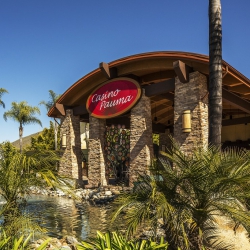The Pauma Band of Luiseno Indians won its longstanding legal case against the State of California. Due to a one-sided and perhaps duplicitous negotiation between the Native American tribe and the administration of Governor Arnold Schwarzenegger in 2004, the tribe was awarded $36.2 million.
The court case was brought by the Southern Californian tribe years ago. The lawsuit stemmed from 2004, when Gov. Schwarzenegger gave Casino Pauma the right to place slot machines in their gaming establishment.
Schwarzenegger Administration Negotiations
In 1999, the state of California handed out gaming licenses to over 60 Native American tribes. The Pauma Band of Luiseno Indians were not one of those tribes. Instead, the Pauma has to wait until 2004 to receive their gaming license.
At the time, the Schwarzenegger Administration informated the tribe that there were no more slot licenses available under the 1999 compact. Instead, the tribe would have to renegotiate a new license.
$7.75 Million in Taxes Each Year
Under those stipulations, the Pauma agreed to pay $7.75 million a year for their slot revenues. The other tribes paid $310,000 a year. It was later determined that additional slot licenses were available in 1999. The 1999 compact should have been used for the Pauma Band of Louseno Indians.
Thus, a lawsuit was filed on behalf of the tribe. In June 2014, a California district court found on behalf of the Pauma Band. California appealed the decision and its ended up in the federal appeals court of Judge Richard C. Tallman.
Judge Richard C. Tallman
In October 2015, Judge Tallman ruled that the state had used deceptive means to collect unfair taxes. Tallman wrote an opinion that the state owed $36.2 million.
To rectify the mistake, the California State Legislature is expected to pass Senate Bill 1187 by August 31, when the legislative session ends. The bill would provide the funds for the state to pay the Pauma tribe.
Cheryl A. Williams Arguments
The state’s appeal was based on the argument that it did not waive its immunity from litigation by the tribe. Pauma attorney Cheryl A. Williams of Williams & Cochrane LLP argued that the state had acted in bad faith in negotiating a new compact.
At times, Judge Tallman did not sound convinced by Cheryl Williams’ arguments. He said in a July 2015 hearing, “The problem … is that you have a compact. You don’t like the terms of it; you want to change it. But as I read the IGRA statute, it only applies if the state wrongfully refuses to enter into negotiations for the original compact.”
Eventually, Judge Tallman ruled that the district court should not have awarded $36.2 million based on “specific performance”, because that criterion is based on breach of contract. Despite Tallman’s quibbling with the district court judge’s reasons for awarding the restitution, he ruled that legal technicalities did not want the $36.2 million award being overturned.
California Gaming Law
California has a particularly complicated set of gambling laws. The state has 194 different licensed gambling venues, making it second only to Nevada in terms of the sheer number of gaming locations. California’s tribal casino establishment is second to none in the United States in terms of casinos. Only Connecticut’s Foxwoods Casino and Mohegan Sun tribal gaming authorities might have more influence on the state government.
For instance, the long-awaited California online poker bill has been hamstrung by the lack of support by the majority of California gaming tribes. Because the Pechanga Band of San Luis Indians and the Agua Caliente Band of Cahuilla Indians oppose the inclusion of PokerStars in California’s online gambling industry, the two tribes have led a coalition of tribal gaming entities in a successful obstructionist policy against online poker.
On the other side are the San Manuel and Morongo bands, which have a partnership deal in place with PokerStars. They San Manuel and Morongo champion the California iPoker, but they have never been able to craft a law which meets the approval of the majority of tribes. Thus, the issue remains in a legal and political limbo. Pechanga and Agua Calienta hedge their bets, though; they are said to have entered negotiations with 888 Holdings on a partnership, just in case.

